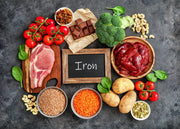I’m a Natural Health Practitioner and we opted for medication to support my son’s ADHD

If you’d asked me a few years ago what ADHD looked like, I probably would’ve rattled off the typical signs — fidgeting, trouble sitting still, blurting things out. What I didn’t fully grasp back then was just how layered and emotional this journey could be — especially as a parent.
Our son Harvey was five when we started putting the pieces together. We’d always noticed he was full of energy (and I mean full), but it wasn’t just that. He’d struggle to focus on a task, forget what he was supposed to be doing two minutes after we said it, and have these explosive bursts of frustration — especially when schoolwork was involved. Getting out of the house in the mornings for school and work was a battle and while I can laugh now, at the time it would be super frustrating to be running late and find him sitting on his bedroom floor playing Lego instead of getting into his school uniform!
Like a lot of families, we started with the usual questions: Is this just normal kid stuff? Is he bored? Is it something we’re missing? But the more we observed — at home and at school — the more it became clear that he wasn’t just being “difficult.” His brain was wired differently. And he was doing his best with the tools he had.
“Dad, my brain feels a bit crazy today.”
That’s how he described it to me once and it stopped me in my tracks. I realised this wasn’t just a parenting challenge; it was a chance to really understand what was happening for him.
We took the path to get a proper diagnosis. Pediatrician, psychologist, assessments — the works. And while that process can be overwhelming, it gave us something powerful: clarity.
I’ve always believed in looking at the body as a whole. So, alongside conventional support, we dove deep into nutrition, gut health, and lifestyle. We trialled removing gluten, reduced sugar, focused on nutrient-dense meals, and supported him with key supplements like magnesium, zinc, and fish oil. His gut was a mess — bloating, irritability, mood swings. But as we cleaned things up, we saw glimpses of a calmer, more focused little boy.
Yes, we also tried medication.
And I’m not afraid to talk about that. We trialled a small dose of Ritalin, and the results were remarkable — not because it “fixed” him, but because it gave him just enough focus to function in a classroom without losing his spark. It was a huge fear for us that medication would dull his personality. But by combining it with the natural work we were already doing, we didn’t need a high dose. Just enough to support him — not suppress him.
He started engaging more in school. His reading improved. His friendships became more stable. And at home? We could breathe again. Not because things were perfect (they never are), but because we understood him better. We were finally speaking his language. We communicate openly with him about how he is feeling and if he feels he needs his medication to support him, and most times he only needs it to help him focus on school work.
What I’ve learned
- ADHD isn’t bad behaviour. It’s a neurological difference — and those kids need understanding, not just discipline.
- Food matters. Inflammation in the gut = inflammation in the brain. You can’t separate the two.
- Natural and medical approaches can work together. It’s not either/or — it’s what works for your child.
- Routine, sleep, and structure are gold. And so is patience!
The biggest shift?
For me, it was learning to meet him where he’s at. To stop expecting him to fit a mould that wasn’t built for him. To give him tools, language, and strategies, and to remind him that his brain isn’t broken. It’s just wired differently. And that’s not a flaw. It’s his superpower.
We still have our moments. There are still Lego distractions, and “I forgot what you said” detours. But there’s also laughter, connection, and growth — for all of us.
And if you’re a parent walking this path too? Just know you’re not alone. And there’s no one “right” way. Trust your gut, ask questions, and don’t be afraid to explore both sides of the fence.
Because sometimes, the best medicine is understanding.
Want to hear more about ADHD? Tune in to my What the Health with James Jensen podcast, Episode 24: Food, Focus and Feeling Frazzled: Understanding ADHD. Download it where ever you get your podcasts, or follow the link here.
Please update the “Product” setting with the product you want to display.





